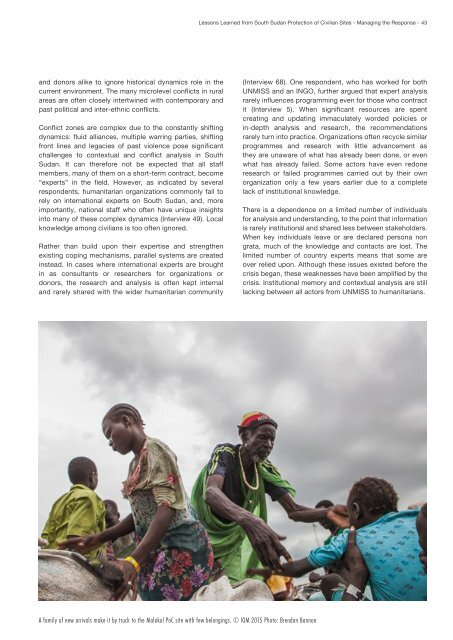Lessons Learned from South Sudan Protection of Civilian Sites 2013–2016
if_we_leave_0
if_we_leave_0
You also want an ePaper? Increase the reach of your titles
YUMPU automatically turns print PDFs into web optimized ePapers that Google loves.
<strong>Lessons</strong> <strong>Learned</strong> <strong>from</strong> <strong>South</strong> <strong>Sudan</strong> <strong>Protection</strong> <strong>of</strong> <strong>Civilian</strong> <strong>Sites</strong> - Managing the Response - 43<br />
and donors alike to ignore historical dynamics role in the<br />
current environment. The many microlevel conflicts in rural<br />
areas are <strong>of</strong>ten closely intertwined with contemporary and<br />
past political and inter-ethnic conflicts.<br />
Conflict zones are complex due to the constantly shifting<br />
dynamics: fluid alliances, multiple warring parties, shifting<br />
front lines and legacies <strong>of</strong> past violence pose significant<br />
challenges to contextual and conflict analysis in <strong>South</strong><br />
<strong>Sudan</strong>. It can therefore not be expected that all staff<br />
members, many <strong>of</strong> them on a short-term contract, become<br />
“experts” in the field. However, as indicated by several<br />
respondents, humanitarian organizations commonly fail to<br />
rely on international experts on <strong>South</strong> <strong>Sudan</strong>, and, more<br />
importantly, national staff who <strong>of</strong>ten have unique insights<br />
into many <strong>of</strong> these complex dynamics (Interview 49). Local<br />
knowledge among civilians is too <strong>of</strong>ten ignored.<br />
Rather than build upon their expertise and strengthen<br />
existing coping mechanisms, parallel systems are created<br />
instead. In cases where international experts are brought<br />
in as consultants or researchers for organizations or<br />
donors, the research and analysis is <strong>of</strong>ten kept internal<br />
and rarely shared with the wider humanitarian community<br />
(Interview 68). One respondent, who has worked for both<br />
UNMISS and an INGO, further argued that expert analysis<br />
rarely influences programming even for those who contract<br />
it (Interview 5). When significant resources are spent<br />
creating and updating immaculately worded policies or<br />
in-depth analysis and research, the recommendations<br />
rarely turn into practice. Organizations <strong>of</strong>ten recycle similar<br />
programmes and research with little advancement as<br />
they are unaware <strong>of</strong> what has already been done, or even<br />
what has already failed. Some actors have even redone<br />
research or failed programmes carried out by their own<br />
organization only a few years earlier due to a complete<br />
lack <strong>of</strong> institutional knowledge.<br />
There is a dependence on a limited number <strong>of</strong> individuals<br />
for analysis and understanding, to the point that information<br />
is rarely institutional and shared less between stakeholders.<br />
When key individuals leave or are declared persona non<br />
grata, much <strong>of</strong> the knowledge and contacts are lost. The<br />
limited number <strong>of</strong> country experts means that some are<br />
over relied upon. Although these issues existed before the<br />
crisis began, these weaknesses have been amplified by the<br />
crisis. Institutional memory and contextual analysis are still<br />
lacking between all actors <strong>from</strong> UNMISS to humanitarians.<br />
A family <strong>of</strong> new arrivals make it by truck to the Malakal PoC site with few belongings. © IOM 2015 Photo: Brendan Bannon


